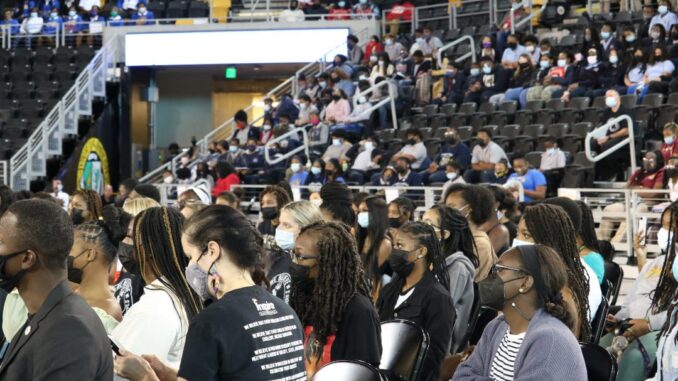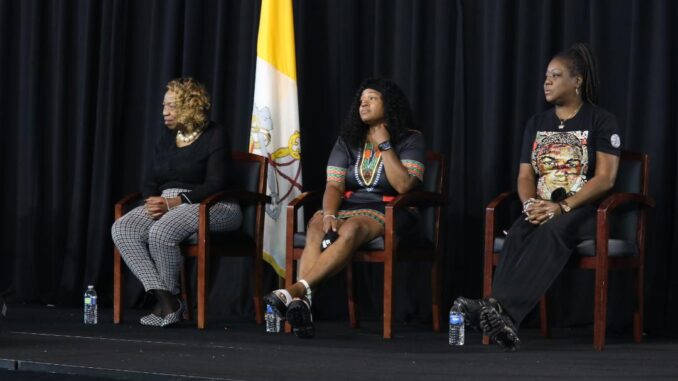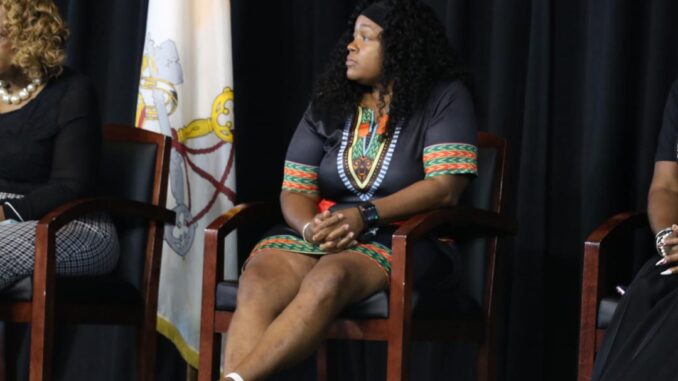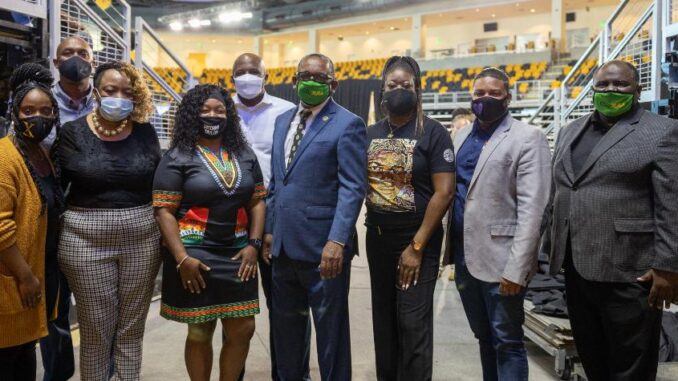
Leah Clark Data News Weekly Contributor
The Mothers of the Movement urged New Orleans youth to remain vigilant on the issues of police brutality, gun violence, and its impact on the community at an event held Friday, Sept. 24th. Gwendolyn Carr, the mother of the late Eric Garner; Tamika Palmer, the mother of the late Breonna Taylor; and Sybrina Fulton, the mother of the late Trayvon Martin visited New Orleans to share both in-person as well as through livestream about the work they continue to do in memory of their children.

“It’s so much going on, and if you get caught up on what the news is telling you right now today, you can lose it really easy, but I stop by here…to leave you a message. I’m here to inspire you, and you’re here to inspire me,” said Fulton during the event, co-hosted by Xavier University of Louisiana, and held at their Convocation Center.

The Mothers of the Movement consist of women whose children were killed by gun violence, mainly at the hands of law enforcement. In their fight for justice, the group has been speaking across the country about how police and gun violence have affected them personally. They represent the numerous stories of police brutality victims that have not received the same attention as theirs.

Inspire NOLA Charter Schools and The Alliance for Diversity and Excellence co-hosted the event with Xavier for the local leg of The Mothers of the Movement’s “The Resiliency Series.” The mothers spoke to high school and college students on finding their purpose in the fight against police and gun violence. The mothers encouraged students to not only attend protests but also to reach out to politicians about the issues affecting their generation.
Carr shared her tactics for enacting change that led to legislation in her son’s namesake being passed. In June 2020, the New York State Assembly passed A.6144B, The Eric Garner Anti-Chokehold Act, that would criminalize the use of this law enforcement tactic, that results in strangulation. The late Eric Garner, Carr’s son, became a household name in 2014 after he was killed by a police officer. While Garner was being arrested for illegally selling cigarettes, an NYPD officer placed him in an illegal chokehold. Garner lost consciousness and his death was ruled a homicide. His final words “I can’t breathe” became a main slogan used in Black Lives Matter protests.

“Instead of writing letters or sending emails or telephone calls, I go, and I get right up in [politicians’] faces, and I tell them what I demand,” Carr said. “You can’t ask, you got to demand what you want,” Carr added about confronting politicians on enforcing the laws.
“The Eric Garner Anti-Chokehold bill is now a law in New York. That was after five years of fighting,” Carr said. “You can’t think that you can just go one time, and things are going to happen. It’s not going to happen like that.”
The mothers told students that their emotions are valid, especially during this time of injustice. Fulton reminded students that it is not their fault that they are often racially profiled as the same was done to her son, the late Trayvon Martin. In 2012, Martin was killed while on a trip to a convenience store by a neighborhood watch volunteer in Sanford, FL. While it has been nine years since the tragedy, Fulton continues to find purpose after it and encouraged students to do the same.
“Even though I’ve been through a lot, I’m still standing. I’m still strong, so we got to motivate one another. We can’t think that’s the end of the story,” said Fulton, who ran for office in 2020 to become Miami Dade’s County Commissioner. She lost her race by less than a 1 percent margin.
On Thursday, Sept. 24th, the mothers held a separate event in the city for educators, parents, and members of the community at McDonogh 35 Senior High School. The Mothers of the Movement had an open conversation on how to be support systems for children during times of injustice. They also advised on ways to educate youth on interacting with police.
“To be up here and have to talk to people, to have to be part of this is unreal to me, I would never wish it on anybody,” said Palmer about being part of the Mothers of the Movement and its work. “I do it, though, because it’s so many mothers that don’t get the opportunity to be up here, to tell their kid’s story, or to stand up for their kids. It’s swept under the rug. They don’t get this light, this platform.”
Palmer detailed her journey of never thinking police brutality could hit close to home until her daughter, the late Breonna Taylor, was killed. Taylor was killed in 2020 after police officers entered her Louisville, KY. home with a no-knock warrant. Officers were looking for two suspects accused of selling drugs, neither being Taylor, and fired over 20 rounds into her apartment. “Justice for Breonna Taylor” became a common chant at Black Lives Matter protests.
Since the Black Lives Matter Movement’s beginning in 2013, police brutality has been brought into a spotlight that it hasn’t received before. However, reports show that this issue has been around for a long time. According to Mapping Police Violence, Black people being killed by police is three times more likely than White people. Also, Mark Hoekstra, a Professor of Economics at Texas A&M University, found that White police officers are five times more likely to fire their guns when dispatched in Black neighborhoods than Black officers.
However, the overall gun violence in Black communities was also a topic the mothers advocate for. Gun violence has also been known to disproportionately affect Black Americans. The Giffords Law Center reports that 52-percent of all gun homicide victims consist of Black men.
As these numbers rise, groups like the Mothers of the Movement continue to travel across the nation in hopes to fight against them. Carr, Palmer, and Fulton are only a few of those that have been affected by police brutality and gun violence. Still, they hope that by sharing their stories they can help the younger generations take charge in the fight.
“I found out I can’t bypass [my son’s death]. I had to go through it,” Carr said. “I was able to turn my mourning into a movement and turn my sorrow into a strategy. Now, I turn my bitterness into a battle for justice.”
Recommended For You.



Be the first to comment